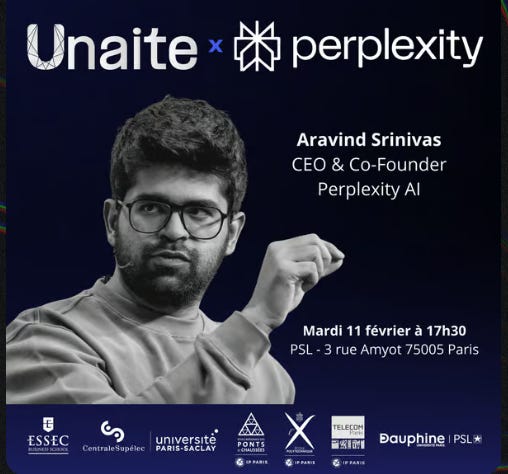Roundtable with Perplexity CEO Aravind Srinivas: AI Search, LLMs, the future and beyonds
Roundtable by Unaite × Perplexity during Paris AI Action Summit
During Paris AI Action Summit, Unaite hosted a roundtable discussion featuring Perplexity CEO Aravind Srinivas alongside students, professors and researchers from top French universities. The conversation delved into the role of Perplexity in the evolving AI landscape, its competitive positioning and the future outlook of AI products.
Perplexity: An AI search engine rather than LLMs
“I don’t really consider LLMs like Deepseek and ChatGPT as our competitors,” Aravind stated. Many people mistakenly equate Perplexity with large language models (LLMs) such as ChatGPT, Deepseek, or Gemini. However, Perplexity functions more like an AI-powered search engine, in a way more similar to Google.
While LLMs focus on generating fluid, conversational responses that most lack up-to-date internet access, Perplexity leverages multiple pre-trained LLMs to enhance its core strength: real-time, fact-based search results. On the other hand, unlike traditional search engines that rank results based on relevance, Perplexity goes a step further by aggregating information based on the referenced links and suggesting follow-up questions to help users gain a deeper understanding of their search topics.
To put it more easily, LLMs serve as the foundational infrastructure, while Perplexity acts as an AI search agent that merges internet search functions with pre-trained LLMs. While it sounds simple, to achieve the greatness of Perplexity, it is actually quite complex.
ChatGPT Web Search vs Perplexity
With ChatGPT introducing a web search feature, does Perplexity still have a competitive edge in this AI racing?
The answer is “Yes”. Aravind compared Perplexity and ChatGPT as Google and Bing. For traditional search engines like Google and Bing, when people searches for information, 95% of the search results are the same, only 5% of the results are different. Yet, Google dominates the market with nearly 90% share, whereas Bing lags far behind at 4%. When people conduct billions of searches per day, the 5% differences are huge. The key difference lies in these 5% of search results—a seemingly small but crucial difference that defines user preference and market dominance.
The same logic applies to AI search. Aravind said that for AI search, the disparity in results are larger than the traditional search engine, almost 20% of the results are different from one another. This 20% difference is noticeable to users and will ultimately shape the competition in AI-powered search.
The Ultimate Goal: Taking on Google
“This may sound a little crazy,” Aravind admitted, “but our ultimate competitor is Google.”
Bold ambition is often a hallmark of disruptive innovation. Perplexity aims to create a user-centric platform that seamlessly combines information retrieval with deep and easy learning experiences.
‘We evaluate the success of Perplexity only based on one criteria: the number of queries conducted. In 2023, the number is 500 million. And we managed to double the number of queries to 1 billion in 2024. Our next step is to reach 100 million queries per day. It is gonna be hard but I do believe that it is the only criteria for Perplexity’s success.”
Redefining the AI Search Economy
Though there are certain features of Google not replacable by Perplexity, like checking the weather, looking up currency exchange rate and perhaps booking a trip, there are huge potentials for other AI agents to develop deep vertically to replace these functionalities.
“It is actually unfair. Think about planning a trip with an AI agent, only to end up booking flights, accommodations, and tickets through Google,” Aravind pointed out. “Google collects all the commissions.”
This insight hints at a potential revenue model for AI startups struggling to monetize their services. If AI search engines can integrate commerce and transactional capabilities, they may carve out a profitable niche.
The Future of Perplexity’s Business Model
As for how Perplexity itself will generate revenue, Aravind acknowledged that the company is still exploring its path. Currently, Perplexity generates revenue solely based on its subscriptions and API usage. As a search engine, Perplexity might also introduce advertisements while keeping the search results credible at the same time. Or perhaps, it will be a mixed of both models.
Perplexity reported an annual recurring revenue (ARR) growing from $7 million at the end of 2023 to 51 million by October 2024. The growth is projected to more than doubled by the end of 2025. With ongoing financial traction, Perplexity is planning to open an office in Paris following Macron's announcement of investing 109 billion euros into AI projects. (More details will be discussed in the upcoming articles. Subscribe for free to stay updated!)
Among the uncertainties, one thing is clear: Perplexity isn’t just competing—it’s trying to reshape how we search and interact with facts and information powered by AI.

